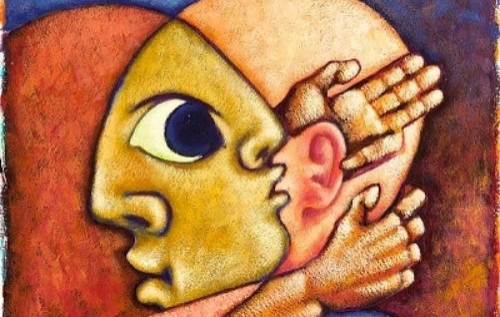By Everyday Health Guest Contributor
 By Delaney Ruston, MD, Special to Everyday Health
By Delaney Ruston, MD, Special to Everyday Health
When I was young, my dad would come to my high school campus, yelling out my name. I remember feeling shame and embarrassment. I would crouch down in my desk hoping someone would get him to leave before my friends would see him, but they always did.
My dad had schizophrenia. His dream was to be a professor, but when he was an English graduate student at the University of California at Berkeley, his illness got so bad that he could not finish the program. Dad was often off treatment and in a state of psychosis. During these times, he would look all over for me, saying how only I could save him.
Things escalated when I was in medical school. I remember the first time dad suddenly appeared at my doorstep, 400 miles from where he was living. I was shocked that he had just appeared like that, and sadly not shocked by how disheveled, irrational, and desperate he looked…I was used to that. I took him into the Stanford ER where I was a student, happy that I would be able to get him care, but that did not happen. Dad returned several times, and eventually I realized that to finish my medical training, I would have to disconnect from him. I moved and unlisted my new phone number.
When I became a doctor for the underserved, I kept seeing families torn apart. I discovered this was happening not because of the illnesses, but because getting loved ones the right services and treatments was so difficult. This reality, I realized, was so rarely discussed.
So once Dad began receiving consistent care and I wanted to reconnect with him, I decided to bring my camera along. I hoped that documenting this could help spark a dialogue on what many families were dealing with in our country. And quite honestly, having the camera with me gave me a sense of purpose that helped me face things I didn’t want to face.
One of those things was my guilt. I hated myself for having disconnected from Dad. One day during filming, Dad said to me, “You did not invite me to your graduation from medical school. You did not invite me to your wedding. What does an invitation look like?” You could see his pain and you could see my pain. It was a really hard moment to expose, but so many people told me that seeing that exchange somehow motivated them to come forward with difficulties they experienced around mental illness in their families.
Inspiring Story Sharing
When the film, “Unlisted: A Story of Schizophrenia,” was released in communities throughout the nation and on PBS, I was amazed by the number of people who told me how seeing the film inspired them to talk more openly about mental illness, and that through these discussions they were learning how to better access mental health care or pass on such information to others. The whole goal of my film was being realized – and I was hooked to share more stories.
It was during the launch of “Unlisted” that I learned something that stunned me and would lead to the next stories – 450 million people in the world are living with some type of mental health problem. It stunned me on two fronts: first, the magnitude of the problem; and second, how rarely we hear about mental illness in different countries. What obstacles did families face abroad?
I began looking for mental health stories when work or family life took me abroad. What I found by filming in China, South Africa, India, and France is that when it comes to experiences of mental illness, we are much more similar than different. This reality was in stark contrast to the few stories that ever make it to the press – that somehow mental illness is culturally defined and thus so different globally.
Why do I say that we are much more similar? Take stigma, very much present in all the countries I visited. Imagine, for example, the challenge of getting an Indian family to participate when they had not even revealed the truth about their daughter’s schizophrenia within their own extended family. They had spent many years telling the rest of the family that their daughter was home studying, and that’s why she couldn’t come to any of the family activities and family engagements.
I also discovered the similar challenges pertaining to mental health care access. The extent of these challenges frankly overwhelmed me when I went to India and South Africa. In these countries, upwards of 80 percent of people do not receive mental health care that could improve their lives.
With the release of the resultant film, “Hidden Pictures: A Personal Journey Into Global Mental Health,” I have happily witnessed what I experienced with “Unlisted” – the power of a film to get people to open up, share stories, and work towards getting needed mental health care to individuals and to families. A highlight occurred on World Mental Health Day on October 10, when 140 organizations across the globe joined me in screening “Hidden Pictures” and held in-person and online discussion events.
HIDDEN PICTURES- Trailer from Delaney Ruston on Vimeo.
An Exciting Juncture
I have been making films on mental health topics for a decade now, and in that time I have seen an increasing level of discussions, internationally and nationally, around improving mental health care. Globally, for example, the 194 member countries of the World Health Organization (WHO) recently pledged to increase efforts to improve mental health care in their countries. I was honored to be asked to screen stories from “Hidden Pictures” at the WHO’s launch event for this historic moment.
Nationally, the number of awareness campaigns that have started is truly impressive. For example, in “Hidden Pictures,” I filmed politician Patrick Kennedy andactress Glenn Close, who spoke frankly about their family struggles and their determination to fight stigma.
 Most exciting is the large-scale collaborations between committed organizations that have begun. In November 2013, I was invited to share stories with a talented group of mental health experts, patients, and caregivers at the Connect 4 Mental Health Community Collaboration Summit, part of the new Connect 4 Mental Health nationwide initiative. Led by the National Alliance on Mental Illness (NAMI) and the National Council for Behavioral Health, working together with Otsuka America Pharmaceutical, Inc. and Lundbeck, the campaign is bringing together industry, advocacy, and communities throughout the United States to work together and inspire widespread discourse to improve access to care around serious mental illness. I know firsthand that getting the right access to services and treatments for those with serious mental illness can be such a challenge, and this initiative seeks to empower leaders from both the mental health community and other community-focused organizations – such as emergency services, law enforcement, and public housing – to recognize how unaddressed serious mental illness may be connected to other local challenges they face.
Most exciting is the large-scale collaborations between committed organizations that have begun. In November 2013, I was invited to share stories with a talented group of mental health experts, patients, and caregivers at the Connect 4 Mental Health Community Collaboration Summit, part of the new Connect 4 Mental Health nationwide initiative. Led by the National Alliance on Mental Illness (NAMI) and the National Council for Behavioral Health, working together with Otsuka America Pharmaceutical, Inc. and Lundbeck, the campaign is bringing together industry, advocacy, and communities throughout the United States to work together and inspire widespread discourse to improve access to care around serious mental illness. I know firsthand that getting the right access to services and treatments for those with serious mental illness can be such a challenge, and this initiative seeks to empower leaders from both the mental health community and other community-focused organizations – such as emergency services, law enforcement, and public housing – to recognize how unaddressed serious mental illness may be connected to other local challenges they face.
I was able to reconnect with my dad in a truly meaningful way because he was finally receiving adequate treatment, supportive housing, and much more. I think that is the story that is told time and time again – when that level of support is there, families can thrive. Sharing our stories, I have learned, is how each of us can help families find the support they deserve.
Delaney Ruston, MD, lives in Seattle, Wash. For information about her award-winning films, “Hidden Pictures: A Personal Journey Into Global Mental Health”and “Unlisted: A Story of Schizophrenia,” visit www.hiddenpicturesfilm.com.







